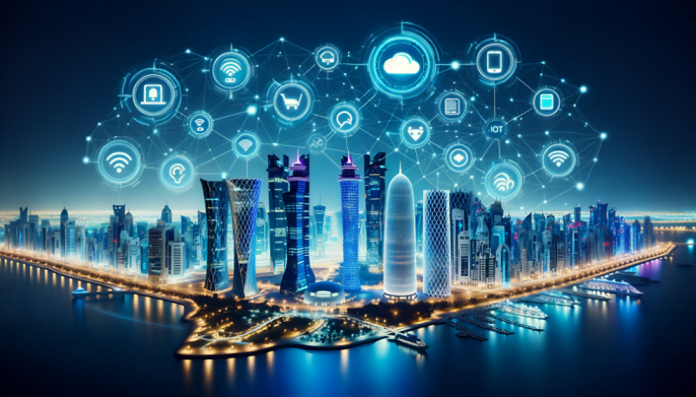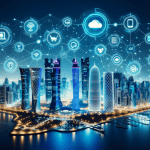The 10th International Symposium on Networks, Computers, and Communications was the site of many vibrant debates concerning contemporary Information Systems, Communication Networks, and Computing Technologies.
Some of the liveliest conversations focused on current and future interactions between the Internet of Everything, which is also known as the IoE, and smart cities. More often than not, these discussions transcended academic discourse and served as an incubator for practical and implementable solutions within Qatar and further afield.
To understand the IoE, it is first important to briefly define the Internet of Things. Put simply, the latter, or IoT, is a platform in which everyday objects, such as vehicles and lighting, are digitized and equipped with sensing and communication capabilities. These objects become part of a computing fabric with other external sensors and mobile devices that form an intelligent layer. “Things” in the network acquire and exchange data in real-time using wireless communication technologies to enable various services.
This data is stored in cloud servers for decision-making as well as further processing and analysis. More than 9 billion “things” are currently connected to the IoT, but this number is expected to exceed 20 billion by 2025.
Unlike the IoT, the IoE incorporates people, processes, and data, to create a more holistic network. Interconnectedness is facilitated by smart sensors and communication technologies that not only collect but also analyze data, thereby rendering it actionable.
The IoE finds its applications across a variety of domains, including smart homes, wearable technologies, industrial settings, healthcare, and more ambitiously, smart cities. In doing so, the IoE is increasingly recognized as the advanced bedrock of smart city evolution, transforming cities from a mere collection of smart things to an interconnected ecosystem where data, people, and processes interact.
Specifically, the IoE serves as an urban nervous system, linking essential services such as transportation, waste management, energy conservation, and public safety, while also adding layers of intelligence and decision-making to the infrastructure.
Home to two smart city projects, Qatar is ideally placed to demonstrate how the IoE can improve public services and create better living conditions. While its international profile undoubtedly benefited from staging the 2022 FIFA World Cup final, Lusail was already a beacon for smart urban development.
Qatar’s second city relies on a centralized cooling system that in turn depends on common IoE “things” such as sensors and actuators to efficiently manage energy use and reduce consumption. Lusail’s “smart” use of “data” ultimately embellishes both its IoE and smart city credentials. Real-time analytics from the cooling system enable predictive maintenance, optimize performance, and lower CO2 emissions.
The Msheireb Downtown Doha represents another leap forward in Qatar’s smart city capabilities. With a future-proof digital infrastructure, ubiquitous connectivity, and user applications, the district’s regeneration deftly illustrates the “things” and “data” facets of the IoE.
A fiber optic backbone and over 600,000 sensors and connected devices form a network that underpins Msheireb’s services, connecting IoT systems and digital applications from a command and control center and facility management hubs. Smart applications fulfill the “people” and “processes” dimensions of IoE, offering a full digital experience for residents and visitors alike. These include Msheireb Information and Wayfinding, an app that guides users through the sustainable and culturally rich Msheireb Downtown area.
Msheireb Information and Wayfinding includes a 3D map, “smart parking” solutions, augmented reality for exploring points of interest, and geofencing that provides location-based notifications that keep users informed on the go.
Qatar’s smart city capabilities are underpinned by TASMU, which seeks to harness the power of technology and innovation to deliver digital solutions that improve lives and drive sustainable economic diversification. TASMU also serves as a living model of how the IoE can translate into actionable strategies that have an immediate and substantial societal impact.
Consistent with Qatar National Vision 2030, TASMU is not just a future-oriented plan; it also embodies the living principles of the IoE and smart urbanism. The program reaches into critical sectors that include transport, logistics, environment, healthcare, and sports and aims to implement an unprecedented 114 digital use cases across the country.
The International Symposium on Networks, Computers, and Communications 2023 demonstrated that many questions remain concerning the future shape and trajectory of the IoE and smart cities. These include communication requirements for transferring data and the role of 5G, the utilization of artificial intelligence at the edge, and the security and privacy of data.
These issues underline the urgency and long-term importance of ethically and sustainably weaving advanced smart technologies into the fabric of cities and improving the quality of life for all citizens.






